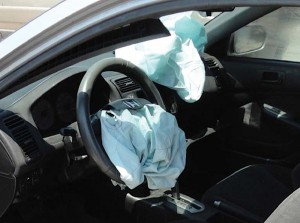
Takata isn't sure how long it will take to manufacture enough replacements for its defective airbags.
Despite pressure from automakers and automotive regulators, embattled Japanese safety systems supplier Takata says it has no idea how soon it will be able to provide the parts needed to complete last month’s recall of 7.8 million vehicles due to potentially deadly airbags.
The company acknowledges it is facing what could become the second class-action lawsuit related to a recall that has so far been linked to four deaths and a number of injuries. And a Takata official says the supplier is discussing with its customers how it might have to help them cover the massive costs associated with the airbag recall.
“But right now, that is not a top priority,” spokesman Alby Berman says. “For now, the top priority is getting replacements parts out.”
Last month, the National Highway Traffic Safety Administration took the unprecedented step of ordering the recall of 7.8 million vehicles sold in the U.S. that were equipped with Takata airbags.
The action expands upon a number of individual recalls manufacturers have ordered over the last year or so due to the defect, which can cause the airbags to inflate over-aggressively. That, in turn, can blast shards of metal and other materials into the passenger compartment.
One death was initially thought to have involved the stabbing of the vehicle’s driver, but it was later determined she was killed by airbag shrapnel that entered her neck.
The cause of the problem – which has seen 16.5 million vehicles recalled worldwide – has yet to be fully understood. But NHTSA, Takata and various automakers, such as Toyota, have statistically linked it to situations in which vehicles are operated in high-humidity conditions. As a result, last month’s service action focuses on such regions as Florida, Puerto Rico and the Gulf Coast.
Critics contend the problem was a manufacturing defect and contend that millions more vehicles operated in dryer regions of the U.S. should also be recalled.
(Are “geographical recalls” putting millions of Americans at risk? Click Here for the exclusive report.)
Even while that subject is being debated, NHTSA is leaning on Takata. During a meeting at the agency’s headquarters last week, NHTSA officials told the supplier it had to speed up production of replacement inflators. Those devices – used to create the hot gases that inflate an airbag during a crash – are the source of the problem.
“Takata is cooperating fully with NHTSA and working to meet all its requests,” stresses spokesman Berman. But as to how soon enough replacement inflators can be shipped to dealers, he admits, “I really don’t know when it will be finished.”
(Click Here for details on the October auto sales results.)
The recall is expected to create serious financial headaches for Takata. Not only must it provide replacement inflators, but also Berman confirms the Japanese partsmaker is having “ongoing” discussions with automakers that might lead to it having to cover at least some of their recall costs. Industry analysts have said that could total into the billions of dollars.
(To see how the latest land speed record was broken, Click Here.)
That doesn’t include the possible sums Takata might have to shell out if legal action, such as the two class action suits filed last month prove successful. Lawyers must yet win court approval to have those suits treated as class actions.
There is also the possibility that the U.S. Justice Department might get involved if it appears Takata delayed taking action on the airbag problem – as some critics are claiming.
Takata has had other legal headaches lately, including prosecution in an ongoing Justice Dept. investigation of price-fixing and bid-rigging by Japanese auto parts suppliers. So far, the company has been fined and several of its executives sentenced to jail.

Great… NHTSA will “force” them to increase production and then Takata could end up delivering 8 million MORE defective airbags. It’s amazing how clueless some government agencies are about the real world. No wonder the U.S. has such overwhelming social issues.